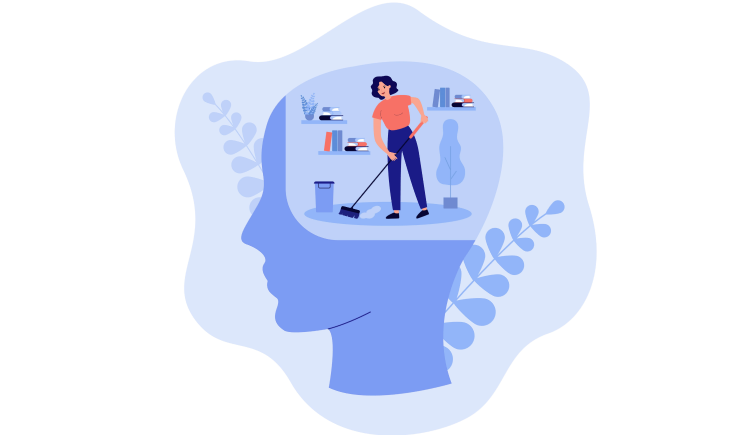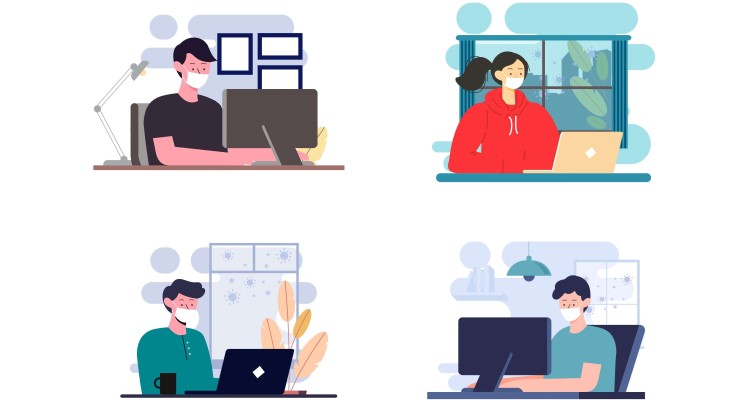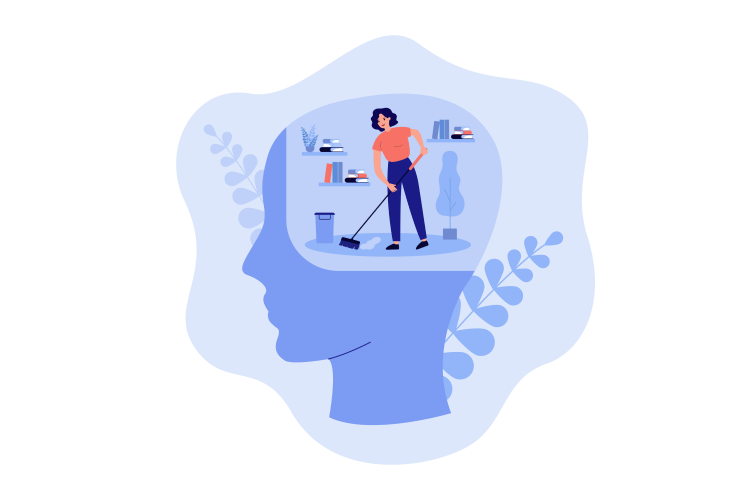Over the course of the pandemic, many of us have transitioned to working from home. This is a pretty big change compared to the traditional office environment, so we have some work from home mental health tips, especially if this is something that you haven’t been able to adjust to straight away.
Not only has working from home changed the way we live our working lives but it’s also had a big impact on our social lives, and our work-from-home mental health. Some of us may spend all day not speaking to another person, or not seeing anyone face-to-face.
This can have a big effect on our mental health – we’re social creatures, and human interaction or social interaction is a crucial part of our well-being.
Table of Contents
ToggleWhat are the Main Effects of Working from Home?
Working from home will be a completely new thing to many people, and it will come with a range of effects–some positive and some negative.
Here are some of the main effects that workers across the world are experiencing from working from home:
- Change in productivity levels – whether it is positively or negatively
- Less face-to-face human interaction
- Change in an office environment
- Loss of normal working schedule
- All meetings and communication over Zoom and emails
- Fewer boundaries between work-life balance
- Hard to stay connected to your colleagues
- Less time spent outside
- No longer have to commute to the office
- Can be harder to say “no” and switch off in the evenings
- Increased feelings of isolation and loneliness
- Harder to allocate time for breaks and personal time
- Negatively impacting those with a disability
- More flexible work routines
- Poor mental health
- Increase in depressive disorders
- Less time spent with loved ones
10 Tips to Maintain Mental Well Being 2024

Even if you’re an employee who doesn’t usually struggle with their mental well-being or mental illness, working from home in isolation can put a big strain on yourself.
Keeping your employees’ mental health in order is an important part of being a manager or employer, so make sure that if you’re in charge of other people, you’re doing what you can to help to improve their job satisfaction.
Here are 10 ways to maintain good mental well-being at all times, but especially during the working day:
1. Set up a routine and stick to the schedule
When you don’t have the usual routine of getting up, getting ready, and commuting to the office, it can be easy to slip out of your habits and become lazy or find yourself working longer hours.
Try and stick to a similar routine that you would have when you were at work. Get up at a reasonable time (but you can have a lay-in if you have extra time without your commute), have a good breakfast, get changed out of your pajamas, and be at your desk for your 9.00 am start – just like you would if you were at the office.
Another useful way to set up a healthy routine is to try meal planning. You can have the best schedule in the world, but suddenly running out of eggs for your breakfast can ruin everything. That is why we recommend to include meal planning into your daily routine as well.
2. Upgrade your workspace
When the pandemic first started, having a computer at the kitchen table was an OK setup, but now working from home has become a bit more permanent. It’s important to have a good workspace for all workers.
Clear some space in your room and invest in a good desk and chair to upgrade your current work environment. Having a specific space for your work will help you to get in the mood to be productive, and will also help to eliminate any distractions that could get in the way of what you need to do.
It will also make your home feel much more like your workplace.
3. Set boundaries
Have you found yourself checking your emails after 5.00 pm, or checking your computer on the weekend to make sure nothing urgent has come through?
These aren’t the things you would do when you were at the office with other respondents, but it’s easy to check your work emails when all of your work equipment is at home.
Start setting boundaries for yourself, like you would at the office. Promise yourself that you’re only going to be checking emails from 9.00 am-5.00 pm from Monday to Friday, and that’s it.
4. Stay connected
If you don’t have any meetings scheduled you may go the whole day without talking to any other person, apart from over email or messages.
It’s important to stay connected to your colleagues and other workers, it can be extremely beneficial to both of your mental health conditions. Even if you don’t have anything work-related to say to them, you can simply check in to see how they’re feeling, or see if they want to get a virtual coffee over a Zoom call to chat.
5. Schedule breaks
In the workplace you’d naturally go for breaks to get a coffee, chat with a colleague, or go grab some lunch, so make sure you schedule these breaks when you’re at home.
Breaks are important, no one can be expected to work non-stop all day – that’s not good for anyone’s productivity.
Most experts will suggest having a 15-minute break every hour or two, just to clear your head and get your mind off of your work for a few minutes.
6. Get outside at least once a day
Getting out and staying active can be hard when you’re at home, it’s far too tempting to just sit at your desk all day and never see the light of day.
Taking a walk outside is great for our mental and physical health, even if it’s just a short 20-minute walk between meetings.
So go out, take in some fresh air and you’ll notice your stress start to melt away!
7. Eliminate multitasking
When you have lots to do at work it seems like you have to try to do everything at the same time, just so you can get it all done.
Multi-tasking can be good in small doses, but can actually have negative effects as you’re not able to focus on tasks individually and the quality of your work may decrease.
Try and focus on one task at a time, when you’ve completed it to a standard that you’re happy with, then you can move on to the same task. It might feel like you’re doing it slower, but really it will take the exact same amount of time.
8. Start saying “no”
In the workplace, it can be easy for your managers to see how hard you’re working and how much you have on. When you’re at home they may not have a good idea of how busy you are and will continue to assign you work, even if you’re rushed off of your feet.
Learning to say no is an important skill that many of us still need to learn but is crucial to our mental well-being as remote workers.
If you’ve got too much on your plate and your manager asks you to do something else, simply say that you’ve got a lot on and can’t take on any more. If it’s an urgent task you could prioritize it over something else instead.
9. Try a digital detox in the evenings
Staring at your laptop screen all day is not a good thing for remote workers, so try and completely switch off all of your electronic devices in the evening – this means no phone, no TV, and no computer.
Digital detox is great to minimize stress and help to switch off your mind after a busy day.
Try playing a game with your family, cooking a meal, reading a book, or starting a new piece of artwork!
10. Work smarter by listening to your body
Our final tip for all of the remote workers out there is to listen to your body.
Who knows us better than our own bodies? No one! If your body feels tired or unmotivated, you should listen to it and not just try to push through those feelings by continuing to work.
If your body tells you that you’re tired, take yourself out for a quick 10-minute walk to refresh your mind, or go grab a coffee.
Trying to keep working when you don’t feel like it isn’t good, your work won’t be good and you won’t be able to focus. It’s a lot smarter to take the 10-minute break so that you can come back to work feeling motivated and focused.
10 Ways to Stay Mentally Healthy During a Pandemic

We all know how stressful the pandemic has been for workers, and it can really cause a toll on our mental health.
Here are 10 ways that you can stay mentally healthy, in the midst of a worldwide pandemic.
1. Keep your immune system strong
None of us wants to get sick, whether that be with COVID or just the seasonal flu so make sure that you keep your immune system strong to prevent illness.
Take your vitamins, eat healthily, and take any flu vaccinations if you’re offered them, especially the COVID vaccination.
Even if you’re at home for remote work, keeping healthy should still be the top of your priorities.
2. Take care of personal hygiene
If you’re at home all day for remote work and not seeing anyone, it can be easy to let yourself go a bit. You may not feel the need to have a shower or wash your hair or face, but letting yourself go can really affect your mental health.
Put yourself first and take care of your personal hygiene, this will help you feel like the best version of yourself and also help you to feel more confident and motivated.
Not only does personal hygiene help you feel good, but it’s good for your health. Regular hand washing and hygiene practices can protect against illness and sickness.
3. Exercise and stay active
We’re not telling you that you need to go out and run a marathon to feel healthy, but staying active is proven to make you feel happier and healthier.
Staying active is a personal thing and will look very different to everyone, you might be able to go on a 5k run every day – and that’s great! But if you can only get out for a 10-minute walk every day, that’s still something to be proud of.
Getting outside and taking in some of the fresh air, will keep your heart pumping and blood flowing. It will also help to clear your head and provide a distraction from a busy day doing your remote work.
4. Stay Informed
Things are changing all the time thanks to the Covid-19 pandemic, and feeling out of the loop when it comes to the latest guidelines and news can lead to us feeling out of control and anxious about what’s going on in the world.
Keep up to date and informed by listening to the news, reading the newspapers, or you could even find out by checking social media or listening to podcasts.
There are plenty of ways that you can keep informed, so choose the right source that works for you.
5. Limit media consumption
Even though it’s important to keep informed, it’s also important to not obsess and overhear everything the second that it comes out.
There are a lot of sad and depressing things happening on the news right now, and if you pay too much attention to it, it can really start to damage your mental health. If you can limit the amount of news you take in, you can feel a lot happier.
Limit yourself to 30 minutes of news a day, this is plenty of time to hear the latest important updates that you need to know but will stop you from having a constant flow of information coming at you.
6. Reach out to friends and family
No matter who you are, this pandemic has affected everyone. We’ve all been stuck at home, worried about our friends and families, and unable to live our lives like we normally would.
No one expects everyone to be fine and quickly adjust to these new changes, so if you do feel like you’re struggling, it’s important that you reach out to the people who love and care about you most – your friends and family.
Simply having a phone call or video chat with a friend or family can reassure and motivate us that everything’s going to be OK. When you’re stuck inside all day with only your own thoughts, it can be easy to make a mountain out of a molehill and it’s only when you speak to someone else that you realize that you’re being unreasonable.
Try scheduling a weekly call with your best friend – it doesn’t have to be for very long – not only will it give you both a chance to talk about your feelings, but it will also be something that you can look forward to every week.
7. Focus on what makes you happy
There are a lot of sad things going on at the moment and it can be easy to dwell on these things, but you need to focus on the things that make you happy.
Everyone has those things that make them happy, whether that be reading a book, painting, or buying their favorite bar of chocolate.
Make yourself your number one priority and try to focus more on the things that bring you simple joys in your everyday life – it really will make all the difference.
8. Start a new hobby
We’ve had some extra time on our hands since the pandemic, so why not put it to good use?
Has there been a hobby that you’ve always wanted to try, like learning how to paint, learning how to play guitar, or picking up a new language? Now’s the time that you can finally pick it up!
Don’t stress out too much about learning new skills in the pandemic, we already have a lot to stress over after all, but if you find a new hobby that can distract you from what’s going on elsewhere, it can be a great escape.
It may even turn into something that you continue to do after the pandemic too!
9. Control the controllable
There’s never been a time when we’ve all felt so out of control, there’s nothing we can do about the pandemic and we have to learn to accept this.
Instead of spending all of our time worrying about the things that are totally out of our control, we should instead be focussing on the things that we are able to control.
We can control our own work schedules, we can control our lifestyle – what foods we eat, how often we get out for exercise, etc.
Once you spend your time on things in your power, you start to realize that really there are a lot of things that we can control.
10. Follow government guidelines
Our final tip for staying mentally healthy throughout the pandemic for all remote workers is to follow the government guidelines.
Our governments make rules based on expert opinions and information that the ordinary person does not have access to, so we have to trust that they are putting in place guidelines that are in our best interest.
Instead of worrying about what’s right and wrong and what you should be doing, you can just follow what your government says – that’s one less thing that you have to worry about yourself.
Working From Home Mental Health according to Reddit
Personally, remote work has been a highly positive experience for me. I truly appreciate the increased flexibility it offers in my daily schedule, as I can now work from anywhere.
You might be interested to check those related posts as well:
- 20 Impressive Work from Home Self Care Tips [and Practices] in 2024
- 15 Amazing Freelancers Mental Health Tips [and Practices] in 2024
- 10 Essential Digital Nomads Mental Health Tips [and Practices] in 2024
FAQ
What is the best day to have off work?
The best day to have off work for remote workers will totally depend on your job and the company you work for. Most people normally like to have a Monday or a Friday off as this will give them a long weekend to enjoy.
However, you may also like to take a Wednesday off so that you get a small break in the middle of the week to help manage stress levels.
But you may have to check with your manager as we’re sure a lot of your fellow remote employees will also be looking for additional days off!
What foods help mental health?
The best foods for mental health benefits and anxiety are normally natural, healthy foods – think lots of fruits and vegetables!
These types of food are all naturally full of vitamins, sugars, and nutrients that help to boost your mood and prevent a mental health problems.
Try to avoid any processed foods that are high in sugar, like fizzy drinks or sweets, these may give you an immediate sugar rush that feels great, but this won’t last long and can make you crash afterward which can be a bad symptom for your mental health.
How do you keep your mood up during a lockdown?
Lockdown can be a tough time as you’re stuck in your house in isolation, can’t see any of your family and friends, and are limited on when you can go outside especially if you’re in a house of remote workers.
To keep your mood up, try and focus on the little things that can bring some joy to the everyday. This could be reading a book, talking to your friend over FaceTime, cooking a meal from scratch, or simply doing an at-home workout.
We hope that all of our tips and tricks will help you to keep your mental health in check while working from home life and prevent any mental health issues.
The main thing to remember is that it’s totally OK to not be OK, and you don’t have to suffer in silence.
This is especially important for male workers, who are often the ones least likely to reach out when they’re in need of help or suffering from depression or anxiety – but this also goes for female workers too.
Lots of people are going through the exact same things as you and trying to adapt to a strange situation, so just reach out to the people who care about you and tell them when you’re struggling with your mental health or anxiety – especially when you’re remotely working.



